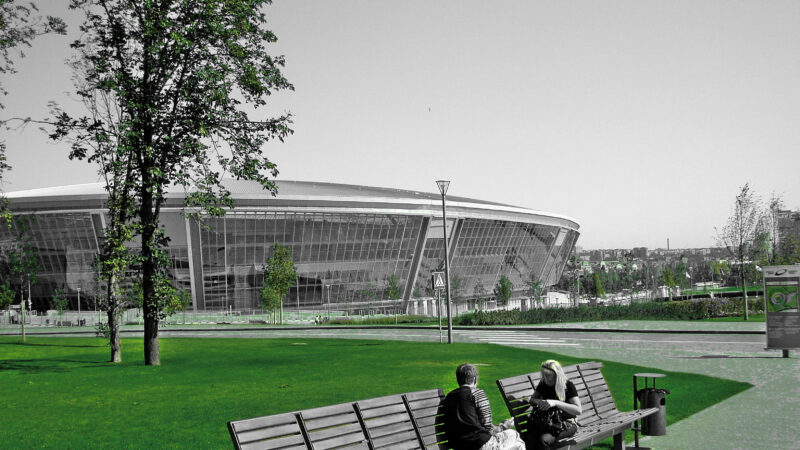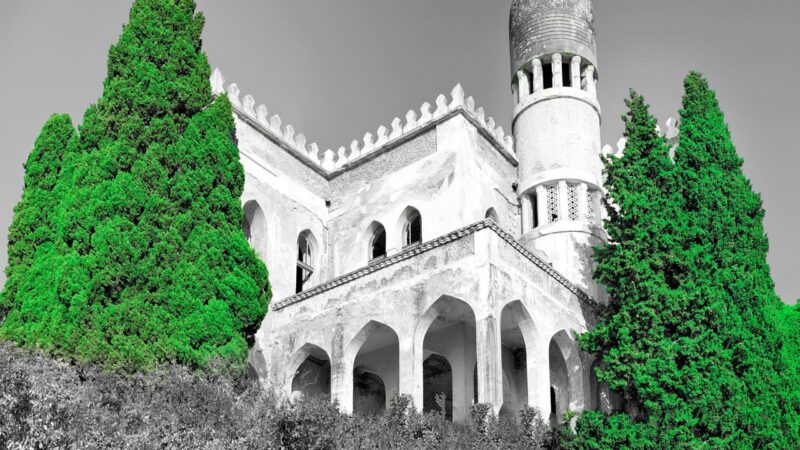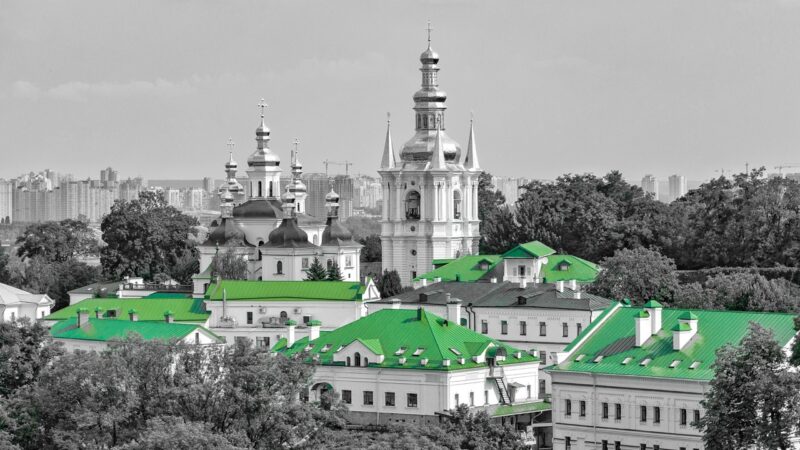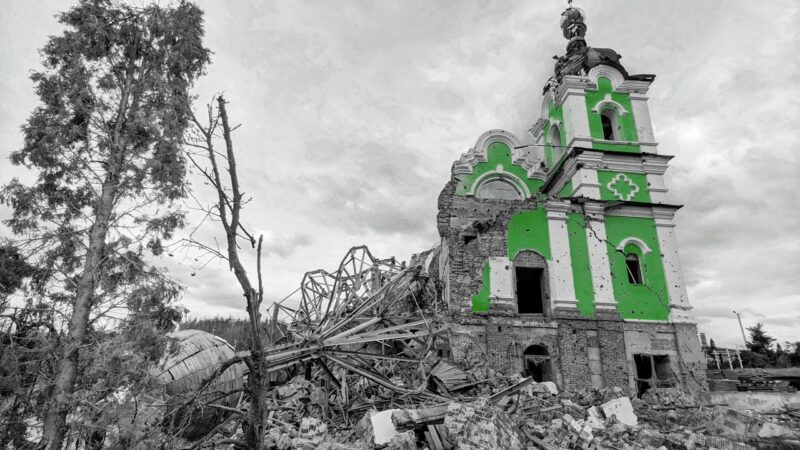The new path of Ukrainian eco-nationalism
Today, in the face of environmental threats, it is not difficult to deem ecology the most crucial issue in modern societies. Around this desire for balance with the living and the spontaneous search for viable solutions, ideas and practices have been built around different intellectual traditions, each animated by their own representation of an environmental utopia for tomorrow. While the defence of nature is mainly citizen-based and increasingly legitimized by its ultra-globalist and humanist essence, it also exists in an identitarian form as eco-nationalism.
Contemporary nationalism can identify perfectly with ecological thinking because it expresses the anguish of witnessing the disintegration of societies and their traditions due to the cultural homogeneity that is promoted by purely materialistic mass consumption. Like ecology, whose semantic root is the Greek word oikos ‘domain, house’, nationalism also advocates the flourishing of a national community through the reintegration of its fundamental attributes—“myths, symbols, historical memories, cultures, rights, and duties.”[1] It can thus see environmental protection as an extension of its own struggle for the security and independence of a community. Far from being ambiguous, this notion is one of the main (often unacknowledged) axioms of contemporary Ukrainian nationalism.
Origins of Ukrainian eco-nationalism
Initially an environmental activism born in the wake of perestroika—a period during which Mikhail Gorbachev thought he could revitalize the political model of the USSR, opening up the environmental question to public criticism—Ukrainian eco-nationalism was motivated by the desire for a culture of political transparency and a higher quality of life that found expression in Ukrainian democratic, and then independentist, discourse. This doctrine was in line if not exactly allied with the mid-1970s Ukrainian dissident movement. In addition to the “responsible scientism” embodied by figures such as Yuriy Shcherbak, it was largely inspired by the literary movement of the “village writers,” who established a romantic vision of Ukrainian rurality that eschewed materialism; its most eminent representative was the writer Ivan Drach.
The anguish generated by the unprecedented Chernobyl cataclysm of 26 April 1986 galvanized the eco-nationalist movement in Ukraine. In fact, the environmentalist movement “Zelenyi Svit” (Green World) could be considered the first post-sixties Ukrainian opposition movement to the hegemony of Moscow’s centralized power. This new credo deifies the relationship between nature and the Ukrainian nation and transforms the debate on environmental protection into an opposition between “us” (Ukrainians) and “them” (Moscow and the USSR), thus developing a very strong nationalist feeling among the Ukrainian population. For the leaders of Zelenyi Svit, preservation of the environment in Ukraine would be very closely tied to the question of decolonization of the territory, which would give it back its national originality. With diverse fields involved in campaigns in favour of the environment, and this within a Soviet society that was becoming increasingly aware of the limits of the system, Zelenyi Svit blazes the trail for the creation of other movements such as “Narodnyi Rukh” (People’s Movement), the nationalist organization that was an important catalyst for Ukraine gaining independence in 1991.[2]
In spite of its innovative projects, reflecting the deep civic-humanist aspirations that had served as a springboard for Ukraine’s independence, Zelenyi Svit saw its influence diminish from 1991 onwards. Somehow the breakup of the USSR was also its death knell. Not only did the Green Party of Ukraine (PZU), heir to the movement, fail to establish itself as a party capable of fostering the emergence of an ecological conscience at the national level in an independent Ukrainian state under reconstruction, it was also unable to deal effectively with the fledgling country’s electoral behaviour or other shortcomings such as the preponderance of oligarchs in a political game where the population distrusted any form of leftist ideals.[3] Thus, the hazardous recombinations of the post-Soviet era in Ukraine marginalized environmental issues or even rendered them obsolete.
The ultra-nationalist movements: New actors of Ukrainian environmentalism?
Marginalized after the debacle of the parliamentary elections from 2002 to 2014, when the PZU did not pass the 1% threshold, ecology and eco-nationalism nevertheless seemed to gradually return to the public debate. Feeding on the bankruptcy of the green parties, ultra-nationalist movements such as Svoboda and the National Corps Party from Azov movement.
. This new form of eco-nationalism is far from being a simple trend or electoral strategy: on the contrary, it is an important, even fundamental, point in their political thinking. Built around a strong representation of Ukraine, the project of the Ukrainian ultra-nationalists is specific and considered as historical: to be the vector of the rebirth of the Ukrainian national spirit by giving it back its “dignity.” While this struggle is mainly hybridized with the demands of the Maidan (fight against corruption, reject the oligarchy, and fight against the Russian occupier), the desire to change things radically has pushed the ultra-nationalists to identify and try to address all the deep-rooted causes of the nation’s problems.
In addition to the pollution inherited from the Soviet production system and encouraged by the ruling elites, the threat to the environment in Ukraine is said to be two-pronged with the Russian war in the Donbas. For them, nature in the Donbas would not only be destroyed as a biosphere, it would also be destroyed as a territory where the ethnocultural fundamentalism of a nation was be embodied. We thus understand the potential for mobilization that these political paramilitary groups can draw from ecology. The natural territory is a representation structuring reality and mutual understanding between the individual and his or her national consciousness. Preserving biodiversity and defending the national territory are now merging into a single, all the more imperative and radical fight, since the Russians are suspected of being the actors. Thus, through the constitution of a discourse in favor of a “Green Dignity” (Zelena hidnist’) and a new type of vigilant action in to preserve the environment, this new eco-nationalism can be compared to a voluntary asceticism in the same vein as their commitment as battalions of volunteers at the beginning of the conflict.
For our land, our kin, and our ancestors: The ethnicist vision of contemporary eco-nationalism
The new Ukrainian eco-nationalism cannot completely free itself from the right-wing and radical references of the ultra-nationalist movements that defend it, and it is the repository of a discourse in which it proposes to be the vector of a new ecological ideal in which weak political institutions cannot be tolerated. Whether it is the Azov Ecological Corps or the Ukrainian branch of the Greenline Front, the new eco-nationalist movements claim to represent a radical ethnicist ecology. Understood as the defence of a European cultural and ethnic identity inherited from Indo-Europeanism and the so-called Aryans, the ethnicist ecology of the new European eco-nationalist movements is by no means “new”—it merely reuses a series of older authors and trends.[4]
Ukrainian ethnicist ecology is initially rooted in reactionary ecological romanticism called ethnic/national. The latter is itself a Slavic extension of the Völkisch current of the German Conservative Revolution of 1920–30. Anti-modernist, ruralist, and sometimes even occultist, this intellectual movement promoted a vitalist revival of the German nation through re-identification with agrarian tribal communities considered close to nature. In the Ukrainian case, it is a question of making the link with proto-Slavic communities or with the ancient Rus’. The main consequence of this backward-looking vision is the development of an anti-liberal, extremist, and anti-modern discourse. Although this thought sometimes contradicts the imperative of modernization of Ukraine that is defended by the National Corps, it should not be forgotten that this rural vision of Ukraine aims to mark the difference with its Russian neighbour, which is considered a colonial industrial power. On the other hand, it is a matter of castigating Western liberalism as the ideology responsible for the acculturation of post-Soviet society. Thus, several anti-modern authors are cited, such as Heidegger, Devi, or Linkola in order to build a coherent ideological discourse.[5]
Beyond these classical references, the ethnicist ecology advocated by these movements also relies on mystical and even neo-Pagan references. Thus Aleksei “Doboroslav” Dobrovolskii (1938–2013), a neopagan Russian priest whose ecological beliefs were profound and radical, is widely cited and even translated despite being banned in Ukraine. As theoretician of Slavic eco-fascism, Dobroslav defended the idea that nature was a reference model for the constitution of an organic Slavic community.[6] These mystical conceptions of organic society were also accompanied by a radical rejection of all forms of monotheism. In addition to being considered foreign Semitic religions, Christianity and Judaism, coming from desert regions, would place no value on the environment and would therefore be responsible for its degradation in the course of human history.
Parallel to this romantic promotion of the land and ancient cultures, eco-ethnicist activists are advocates of radical violent action. While these processes may find inspiration in other radical environmental movements such as EarthFirst! or Sea Shepherd, they find much of their legitimacy in the post-Maidan context, where the boundaries between political movements and violent action are increasingly blurred. In such a context where violence is almost commonplace, the frustrations felt towards the often-passive authorities in the face of the environmental emergency are therefore prompting some people to switch to radical alternative actions when conventional methods have been exhausted. This is a form of green vigilantism. Nevertheless, these practices are still very marginal and are rather subordinated to more peaceful actions such as prevention campaigns or the cleaning up of green spaces.
Conclusion
Eco-nationalism in Ukraine is therefore a true historic development. A late awakening of an ecological consciousness in the context of the partial opening of the Soviet system, it is above all a pro domo plea for responsible management of the environment. This desire to “solve” environmental problems has thus generated a patriotic discourse of opposition that is now being reused by ultra-nationalists. Far from being the simple promotion of objective skills under the pretext of a better understanding of national issues, the new eco-nationalism, however, is only surfing on re-fertilization, the dissociation of legal relations, power relations, and the bankruptcy of legitimate institutions emptied of their substance (state, green parties) at the end of the Maidan. Thus movements such as Azov, by exalting its virtues made consistent with their radical images and rhetoric built around questioning the post-Maidan political system and ethnicism, the ultra-nationalists, for want of competition, are restoring a certain unity to a part of the political ecology in Ukraine.
The results of my research on Ukrainian eco-nationalism are presented in my Master’s thesis : ПРО ЗЕМЛЮ РІДНИЙ : Eco-nationalisme, Ecologie radicale de droite et Eco-fascisme dans l’espace ukrainien
Adrien Nonjon is a Ph.D. candidate at the National Institute for Oriental Languages and Cultures (INALCO) in Paris and a Research Fellow at IERES (George Washington University). He holds a M.A. in Geopolitics (French Institute of Geopolitics) and Political Science (Sorbonne University). His academic interests include geopolitics of Ukraine and the post-Soviet far right.
[1] SMITH A., National Identity, Oxford University Press, 1991, Oxford, op.cit. p.14.
[2] MARPLES D.R., Ukraine under Perestroika: Ecology, Economics and the Workers’ Revolt, University of Alberta Press, 1991, p.224; full name of Rukh translates as People’s Movement of Ukraine for Reconstruction.
[3] WILSON A., Virtual Politics – Faking Democracy in the Post-Soviet World, Yale University Press, 2005, p.336.
[4] FRANÇOIS S., Comment l’écologie est-elle conçue à l’extrême droite ? [How is ecology conceived on the far right?], https://tempspresents.com/2017/10/12/comment-lecologie-est-elle-concue-a-lextreme-droite/
[5] Greenline Front blog, http://greenlinefront.blogspot.com
[6] ŠiženskijR. V, Философия доброй силы: Жизнь и творчество Доброслава [Philosophy of Good Power: The Life and Work of Dobroslav], Пенза: Научно-издательский центр “Социосфера”, 2012. P.216





